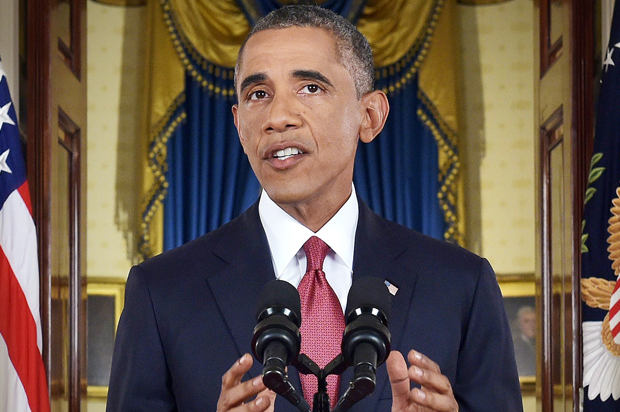The White House finally got around to submitting its draft authorization for use of military force for Congress to consider, debate, amend, vote on, ignore, ruin, whatever. And if it passes in some form or another, the war that’s already been underway for nearly six months might actually rest on a solid legal foundation.
The good news for people who don’t like open-ended ground wars — which, shockingly but not shockingly, is not everyone — is that the administration won’t pursue what could euphemistically be described as “maximum flexibility.” It has backed away from its previous posture, as annunciated by Secretary of State John Kerry in congressional testimony last December, that it didn’t want an explicit ban on ground combat troops. That’s the key thing here, and it was a pleasure to make such a fuss over it.
The president has always claimed that he will not deploy combat troops to fight a ground war against ISIS in multiple countries in the Middle East. But according to the administration’s current, dicey justification for war — the 2001 AUMF against Al Qaeda and affiliates, and conveniently lenient legal readings thereof — the only thing getting in the way of a ground war is the president’s judgment. As in: President Obama could simply change his mind. Or incoming President John Bolton or Hillary Clinton could decide that yes, an open-ended ground war in multiple countries in the Middle East would be an excellent investment of resources. This is why it’s so important to straitjacket the presidency, and Obama seems to understand how this could affect his legacy.
Now it’s just a matter of getting the words right. Specifically, five words: “enduring offensive ground combat operations.” This is what the White House’s draft AUMF prohibits — the language it uses to bar the “long-term, large-scale ground combat operations like those our Nation conducted in Iraq and Afghanistan,” as the White House puts it in an accompanying letter. The letter goes on to list exceptions:
The authorization I propose would provide the flexibility to conduct ground combat operations in other, more limited circumstances, such as rescue operations involving U.S. or coalition personnel or the use of special operations forces to take military action against ISIL leadership. It would also authorize the use of U.S. forces in situations where ground combat operations are not expected or intended, such as intelligence collection and sharing, missions to enable kinetic strikes, or the provision of operational planning and other forms of advice and assistance to partner forces.
If the prohibition on “enduring offensive ground operations” explicitly means everything but those itemized exceptions — special ops on high value targets, spotters, search and rescue teams, intelligence officials, advisers — then that’s not so bad. Most of the AUMF proposals have allowed these exceptions. The “boots on the ground” that are important to restrict are those that could blossom into tens or hundreds of thousands.
But that’s just what the letter says, and a letter is just a letter. Meanwhile, this is all the the draft legislation itself has to offer:
(c) LIMITATIONS.—
The authority granted in subsection (a) does not authorize the use of the United States Armed Forces in enduring offensive ground combat operations.
And… that’s the end of that section. Hmmm. Letting “enduring offensive ground operations” just sit there like that, without any hard definition, runs the risk — or perhaps serves the intention — of allowing it to get loopholed beyond any recognition. Some hack lawyer for this or the next administration could come along and offer a legal opinion that “enduring” means, say, more than 100 years. Or that this war against various people in the desert thousands and thousands of miles away is strictly a defensive operation — there is no “offensive” nature whatsoever in these operations. This is about defending freedom! How dare you! Etc etc.
Or there’s the most obvious path regarding “advisers.” Hell, “possible presidential candidate” Lindsey Graham, relentless in his thirst for death, is already sniffing out this one:
[embedtweet id=”565211590795223040″]
It’s just a draft, sure, fine, but that language will need some tightening up. As Rep. Adam Schiff, one of the leading House Democrats on this issue, says in a statement today, the AUMF “should place more specific limits on the use of ground troops to ensure we do not authorize another major ground war without the President coming to Congress to make the case for one.” (He also notes another major problem: the new AUMF doesn’t address the 2001 AUMF. Meaning, if this new one were to pass and sunset in three years, the next administration could revert to the broad, problematic reading of the 2001 AUMF under which the White House is currently operating.)
The obvious problem with regards to tightening the prohibition of ground combat troops is that the Republican party controls Congress. And its leaders will want to move in the opposite, more expansive direction. It seems ironic, at first, that the Republican party would want to give the Imperial Tyrant President the broadest imaginable executive authority here, authority that the Imperial Tyrant President himself isn’t even calling for. This isn’t really about the current president, though. It’s about the presidency. The stakes aren’t just about who’s in charge today, but about who’s going to be in charge come January 2017 and beyond. If that person wants a ground war against ISIS, they should have to come to Congress and make that case.

